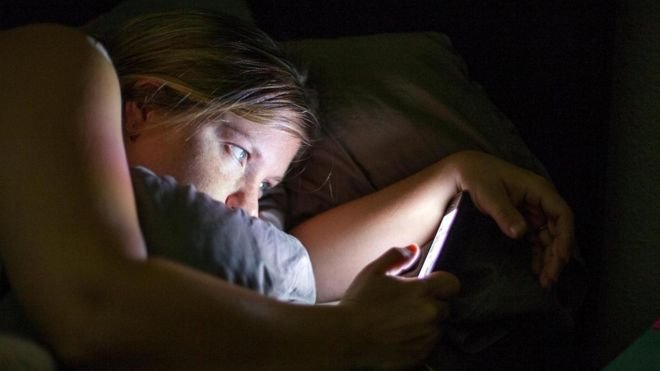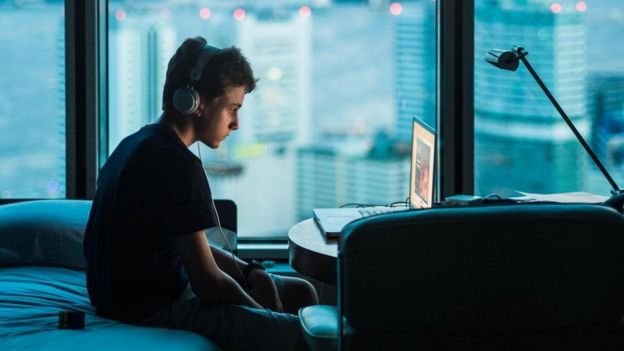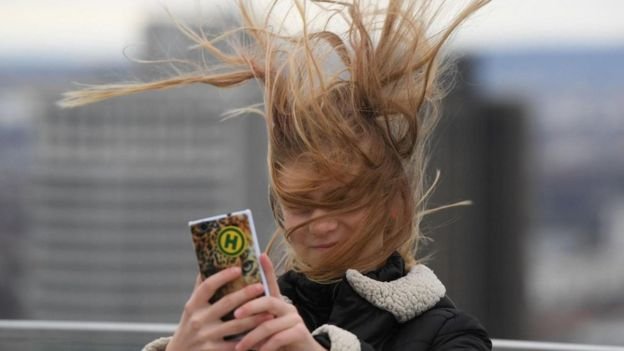 Social media negatively affect sleep. In the following lines, we reveal the time when researchers warn against using social media to avoid the negative effects.
Social media negatively affect sleep. In the following lines, we reveal the time when researchers warn against using social media to avoid the negative effects.
Teenagers and children spend a lot of time in front of screens of various devices every day. Reports indicate that children between the ages of 11 and 15 spend six to eight hours a day in front of monitors, as well as the time they spend in front of the computer to perform homework.
In fact, one analysis suggested that adults in the UK spend more time on screens than sleep.
Children are now using technology at an early age, with research showing that a third of children in the UK use a tablet before the age of four.
It is therefore not surprising that the new generation joins social networking sites in line with the generation that preceded it. The Snape Chat application, for example, is popular among teenagers. A 2017 survey found that 70 percent of teens in the United States, aged 13 to 18, use Snape Chat, The site is also used in the UK, and the percentages are not different in the UK.
The number of users of social networking sites now exceeds 3 billion. The average number of hours spent by adults in the United States on social networking sites ranges from two to three hours.
This phenomenon reveals some disturbing results. The proliferation of social media has raised the interest of researchers and prompted them to study the effects of using social networking sites on our health, including their impact on sleep, which is currently receiving unprecedented attention.
So far, it has become abundantly clear that social networking sites negatively affect our sleep and, therefore, our mental health.  Since social networking has reached unprecedented levels, Bryan Braimack, director of the Center for Media, Technology and Health Research at the University of Pittsburgh, has been studying the relationship between technology and mental health, with the help of Jessica Levinson, to look at the advantages and disadvantages of this together.
Since social networking has reached unprecedented levels, Bryan Braimack, director of the Center for Media, Technology and Health Research at the University of Pittsburgh, has been studying the relationship between technology and mental health, with the help of Jessica Levinson, to look at the advantages and disadvantages of this together.
It was initially thought that social networking sites had a negative and positive impact on depression, that is, it may alleviate depression in some cases and may increase it further. But an opinion poll of some 2,000 people revealed results that were not taken into account.
Social networking sites have been shown to have a negative effect on depression. In other words, the greater the use of social networking sites, the greater the likelihood of depression, anxiety and social isolation.
"If you look at it objectively, when you see someone interacting with their friends and smiling and putting in emoji that expresses their feelings, you may say that this person has a lot of friends and acquaintances, that they are very close and close, but we find that these people have a feeling Social isolation ".
But the nature of the relationship between social networking sites and depression is not yet clear. Does depression lead to increased follow-up of social networking sites? Or is social media more depressive?
What is the effect of nighttime shifts on our bodies? Braimac believes that both possibilities may be true, and may mean that a person may enter a "vicious cycle". The more depression, the greater the demand for communication sites, and then worsened his psychological state.
However, another concern is that, in a study conducted in September 2017, Braimac and his colleagues found 1,700 adults, that the use of social media was closely linked to mental health problems.
They found that following up on social networking sites before bedriding for 30 minutes increases the risk of insomnia. "This has nothing to do with the time I've been following up all day," says Braimak.
Source Image Alamy  It seems necessary to avoid the use of technological devices half an hour before sleeping, so that we can enjoy a quiet sleep.
It seems necessary to avoid the use of technological devices half an hour before sleeping, so that we can enjoy a quiet sleep.
This is due to several factors, including recent warnings that the blue light emitted from the screens reduces the levels of melatonin, the hormone that alerts us that it is time to sleep.
It is also likely that the use of social networking sites will increase anxiety as the day goes by, so it is difficult to stop thinking about bedtime. "Then we have thoughts and feelings and insist on when we get ready to sleep," says Braimak.
But another reason is that social networking sites attract users to follow them and reduce time spent sleeping.
Research has shown that the time we spend watching screens may overwhelm the time of physical activity, which helps people sleep.
"If you hold a smart phone in your hand, you will not swing your arms at the usual speed, and your feet will not move," says Eric Siegman, an independent health-care lecturer. Over six months, we will have a new generation of little movement. "
If the use of social networking sites exacerbates anxiety and depression, it means that it also affects sleep.
When you stay awake in your bed you compare to other users of social networking sites who express their happiness and joy in life, or boast of their wonderful journeys, you will feel that your life is dismal compared to them, and will control negative thoughts and prevent you from sleeping.  So, we seem to be in a loop of intertwined problems, as the use of social networking sites increases depression, anxiety and insomnia.
So, we seem to be in a loop of intertwined problems, as the use of social networking sites increases depression, anxiety and insomnia.
The lack of sleep may result from mental health problems, but such problems at the same time may lead to lack of sleep.
The researchers also linked the lack of sleep to other disadvantages, such as increased risk of heart disease, diabetes, obesity, poor scholastic achievement, slow response to leadership, behaviors that endanger others, increased alcohol and substance abuse, and other damage.
Worse still, young people are most affected by sleep deprivation. In adolescence there are social and biological changes that have a major impact on growth and development.
The teenagers do not feel what they call "the need to sleep," says Jessica Levinson, of the University of Pittsburgh School of Medicine. "The inner rhythm of sleep makes you feel sleepy as long as you're awake, except late at night compared to childhood, Sleep at night.
But Levinson says that the increase and change in the use of social media, as well as the research and articles she addresses, may outweigh the ability of researchers to keep pace with them.
"We are doing our part to detect the effects of using social media, whether negative or positive, and teachers, parents and paediatricians should ask adolescents how often they use social media, when, and what they feel when using it," she said.  It is clear that moderation in the use of social networking sites is the solution to address its damage. Siegman is advised to devote specific times of the day away from screens, and this applies also to children.
It is clear that moderation in the use of social networking sites is the solution to address its damage. Siegman is advised to devote specific times of the day away from screens, and this applies also to children.
He believes that parents should locate places at home to use or completely abstain from using technological devices. "We do not allow social media to seep into every part of our lives without censorship or censorship," he says.
"This oversight is important because children do not have the ability to control their motives and may not know when to stop."
Braimac does not demand people to completely refrain from using social networking sites, but he advises them to regulate the number of times they are used, and more importantly, to determine when they use them.
"These sites are doing everything in their power to attract you to keep them posted, and it will be difficult to meet them," he said. And hopes that extensive research and management consulting will stand in the row of users to achieve some balance.
If you are tired and confused in the morning because you were staring at your phone before going to bed last night, you might be able to handle it yourself. Have a nice sleep if you put your phone aside at night.
Fascinating post! I went ahead and followed you, follow back so we can help each other grow!